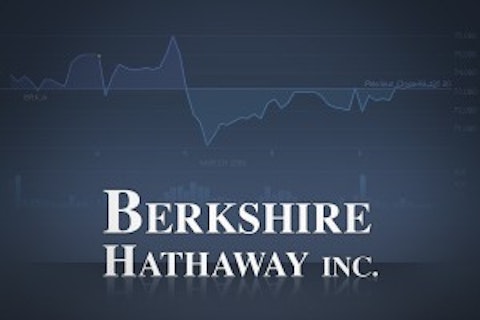When I run across a company I might be interested in as an investment — one that I know next to nothing about — I typically start my investigation by just jumping in and taking a quick look around. And that’s how I’ve designed this “7 Things You Need to Know” series: a quick scan of the facts, in no particular order, that gives you, the potential investor, a mix of high- and low-level takeaways.

1. Berkshire has two share classes
As I write this, the price for a single share of BRK-A is $174,934. Yes, almost $180,000 per share. And those shares are up 1.36% today, or $2,345 per share. The average trading volume for BRK-A shares is 51,242.
As is obvious from that low trading volume, most investors will never buy these shares — which cut you into a larger share of Berkshire Hathaway Inc. (NYSE:BRK.B)’s profits — and will instead buy BRK-B shares, which are going for $116 today, with a more recognizable average trading volume of 3.9 million shares.
2. Berkshire is a “publicly owned investment manager”
What does this mean? When you invest in Berkshire Hathaway Inc. (NYSE:BRK.B), in either share class, you’re buying into the performance of the company’s common stock holdings as well as its wholly owned subsidiaries. These common stock holdings include such corporate stalwarts as American Express Company (NYSE:AXP), The Coca-Cola Company (NYSE:KO), Johnson & Johnson (NYSE:JNJ), and Visa Inc (NYSE:V).
The wholly owned subsidiaries famously include GEICO Auto Insurance, NetJets, and See’s Candies. Among other things, earnings generated from these wholly owned companies are used to buy other companies, with which to generate more earnings for Berkshire Hathaway Inc. (NYSE:BRK.B), or to buy more common stock, with the same purpose in mind.
3. Blistering stock performance
Berkshire CEO and COB Warren Buffett isn’t the famous investor he is for nothing. Since BRK-B shares began trading in 1996, total shareholder return is 463.1%. Shares in financials sector investor-darling Bank of America Corp (NYSE:BAC) have been trading since 1986, and have returned 92.72% to investors.
4. Berkshire had a great first quarter
For the first quarter of this year, Berkshire Hathaway Inc. (NYSE:BRK.B) grew its revenue by 15% year over year, and its earnings by 50.8%. Trying to get closer to an apples-to-apples comparison to Berkshire, fellow publicly owned investment manager BlackRock, Inc. (NYSE:BLK) grew its year-over-year first-quarter revenue by 8.9% and its earnings by 10.5%.
5. Warren Buffett makes less money than you think
Last year, Buffett was paid just $423,000 from Berkshire Hathaway Inc. (NYSE:BRK.B) for his dual roles of CEO and chairman. Goldman Sachs Group Inc (NYSE:GS) CEO Lloyd Blankfein made more than $8 million last year. Jamie Dimon, in an off-year for the CEO and COB of JPMorgan Chase & Co. (NYSE:JPM), made just $1.67 million.
The low-profile of Buffett’s modest take-home pay is a refreshing change in this age of high-profile, high-paid, and sometimes low-performing corporate chiefs.
6. Berkshire directors “eat their own cooking”
Most of Berkshire’s directors have a major portion of their own net worth invested in the company. Buffett’s longtime managing partner Charlie Munger has 80% or more of his personal net worth tied up in Berkshire shares. Buffett’s portion is 98%. Now that’s confidence in your company’s product.
7. A solid return on equity
Trailing 12 months, Berkshire’s ROE is 8.87%. That’s not JPMorgan Chase & Co. (NYSE:JPM)’s 11.55%, Wells Fargo & Co (NYSE:WFC)‘s 13.07%, or even BlackRock, Inc. (NYSE:BLK)‘s 9.87%, but when you consider the range of wholly owned companies Berkshire manages, along with the array of common-stock holdings it has to monitor, 9.87% is very good.
Even big banks like JPMorgan Chase & Co. (NYSE:JPM) and Wells Fargo & Co (NYSE:WFC), which engage in such varied kinds of banking business, don’t face the same sort of operational and managerial challenges Berkshire does.
Foolish bottom line
When you invest in Berkshire Hathaway, you’re investing in the investing decisions of Warren Buffett and Charlie Munger. Buffett and Munger rarely disappoint, and they put their own money where their mouths are. Performance and personal commitment: What more could you ask for from an investment?
The article 7 Things You Need to Know About Berkshire Hathaway originally appeared on Fool.com is written by John Grgurich.
Fool contributor John Grgurich owns shares of Goldman Sachs and JPMorgan Chase. Follow John’s dispatches from the not-so-muddy trenches of big-banking and high-finance on Twitter @TMFGrgurich. The Motley Fool recommends American Express, Bank of America, Berkshire Hathaway, BlackRock, Coca-Cola, Goldman Sachs, Johnson & Johnson, Visa, and Wells Fargo. The Motley Fool owns shares of Bank of America, Berkshire Hathaway, Johnson & Johnson, JPMorgan Chase, and Wells Fargo.
Copyright © 1995 – 2013 The Motley Fool, LLC. All rights reserved. The Motley Fool has a disclosure policy.





